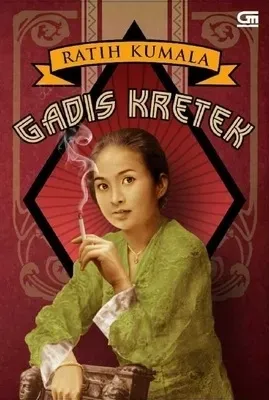Gadis Kretek

Author: Ratih Kumala
Category: Fiction, literature
Language: Indonesian
Publication Year: 2012
Pages: 284
Description:
*Gadis Kretek* by Ratih Kumala is a fascinating novel that blends history, romance, and the legacy of Indonesia’s kretek (clove cigarette) industry into a richly woven narrative. Set against the backdrop of Indonesian history, the book offers a glimpse into both personal and national struggles, with its central theme being the intergenerational impact of family secrets and the rise of a business empire. Kumala's storytelling strikes a balance between historical fiction and personal drama, making it a compelling read.
The novel opens with a dying man, Soeraja, the patriarch of a successful kretek company, who utters a mysterious name: Jeng Yah. This cryptic revelation throws his three adult children—Lebas, Karim, and Tegar—into a whirlwind of confusion and curiosity. Each of them has their own connection to the family business, but their father’s final words push them to embark on a journey to uncover the truth behind this woman, who seemingly holds the key to a long-hidden secret. What they discover takes them back to their father’s youth, a love affair, and the beginning of the kretek empire that would shape their lives.
What makes *Gadis Kretek* stand out is how effortlessly it weaves together personal drama and the broader sweep of Indonesian history, particularly the transition from Dutch colonial rule to independence. Kumala deftly uses the rise of the kretek industry as a metaphor for Indonesia’s own evolution, highlighting how local traditions and industries survived and thrived despite foreign influence. The kretek cigarette itself, made from a mix of tobacco and cloves, is symbolic of this blend of the old and new, the local and the foreign. As the family’s fortunes rise with the kretek industry, the novel explores the ways in which history, politics, and personal choices are all interwoven.
The novel alternates between the present-day investigation of Soeraja’s children and the past, where readers are taken through the turbulent 1950s and 1960s, a time of political unrest and societal change in Indonesia. This dual timeline adds richness to the story, as Kumala juxtaposes the innocence of young love with the harsh realities of revolution, economic hardship, and personal betrayal. Jeng Yah, the elusive figure at the heart of the mystery, is revealed to be more than just a romantic interest—her role in the narrative is a bridge between Soeraja’s youth and his eventual rise to power in the kretek industry.
Soeraja’s love story with Jeng Yah is not your typical romance. It’s bittersweet and marked by the societal and political constraints of the time. Their relationship is overshadowed by the chaos of the era, and the choices they make reverberate through the generations. Kumala writes these scenes with tenderness, capturing the emotional depth of their connection while also making the reader painfully aware of the external forces that threaten to tear them apart.
In contrast, Soeraja’s children represent the modern face of Indonesia. They are disconnected from the hardships of the past and more concerned with the practicalities of running the kretek business in the present. Their journey to uncover their father’s past, however, forces them to confront the very roots of their family’s success and the sacrifices that were made to secure it. This exploration of family legacy and the weight of untold stories is one of the novel’s most compelling themes.
Kumala’s writing is both accessible and evocative, painting vivid pictures of life in Indonesia during both the colonial and post-colonial periods. Her descriptions of the kretek-making process are particularly memorable, showing how this labor-intensive, highly-skilled craft was both an art and a livelihood for many Indonesians. She doesn’t shy away from depicting the political tensions of the era, including the violent struggles and shifting alliances that defined much of Indonesia’s mid-20th-century history.
At its heart, *Gadis Kretek* is a story about identity—both personal and national. It’s about how the past shapes the present and how family secrets can ripple across generations. The novel’s pacing is well-executed, slowly revealing layers of mystery while building emotional depth for the characters. The relationships between Soeraja and his children, as well as the strained yet affectionate bonds between the siblings themselves, are drawn with nuance, giving the family dynamics a real sense of authenticity.
One of the novel’s few shortcomings might be that some readers could find the political backdrop a bit dense or difficult to follow, especially if they’re unfamiliar with Indonesia’s history. However, Kumala does a commendable job of not overwhelming the reader with too much information, focusing instead on how these larger events affect the characters on a personal level.
In sum, *Gadis Kretek* is a beautifully written novel that offers a rich, textured portrait of Indonesia’s kretek industry, while also exploring the complexities of family, love, and legacy. Ratih Kumala’s ability to blend historical context with a deeply personal story makes this a novel that resonates on many levels. Whether you’re interested in Indonesian culture, the impact of history on individuals, or just a good mystery with a love story at its core, this book delivers.
Personal Notes:
Nice story.
Back to Home